The Aretalogy of Isis from Andros
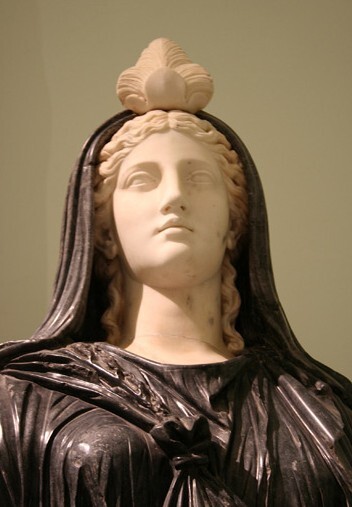 A Roman image of Isis
A Roman image of IsisToday, I’m delighted to share with you an English translation of the Isis aretalogy from the island of Andros, Greece. The island is in the Cyclades and the aretalogy was found in its capital city, Palaiopolis. Being a coastal city, it was well positioned for trade, both in goods and ideas, such as the reception of non-Greek Deities like Isis.
The English translation is the work of Pentamegistus, an esoteric blog, and is translated from Isis scholar Laurent Bricault’s French translation of the aretalogy. So it’s a translation of a translation. Here’s the link to Pentamegistus’ original post. The original aretalogy is in Greek.
The text is fragmentary in many spots, which is where you see the “…”s below. I’ve taken out the line numbers since they’re not needed for our purposes. (If you’d like to see the line numbers, in order to refer to specific lines in the text, for instance, please see the original post.) I’ve also capitalized Isis’ and other Deities’ pronouns and made some hopefully-clarifying comments inline, in brackets and blue. As you’ll see, with so many lacunae, it can get pretty difficult to make sense out of some of it.
But, we’ll see what we can do.

The Aretalogy of Isis from Andros, Greece
with a little bit of commentary
Queen of Egypt, linen-robed, filled with care for the ancient land, which the deep furrow makes abundant with wheat. Sistrum-bearing Bubastis and Memphis [likely, the Egyptian cities most connected with Isis in Greek minds] rejoicing in its fruitful fields. There, a sacred law, the work of pious kings, erected an immovable stele [a reference to the stele that the Kyme aretalogy says was set up at the Temple of Ptah in Memphis, and which may have the original Isis aretalogy inscribed upon it; some researchers suggest that by circulating copies (or riffs on the text, in some cases) of these aretalogies throughout the Hellenistic world, Isis devotees gained a sense of group connection and community], a supreme emblem of Thy kingship [that is, Isis’ rulership of the land of Egypt].
 Head of Isis-Fortuna
Head of Isis-FortunaThe suppliant crowds She addresses thus:
“I am Isis of the golden throne, whose scepter is strong, the fiery solar ray having shone upon the nourishing land [Isis is acknowledged as a Sun Goddess and She is an Eye of Re; Apollo was a major Deity on Andros and so the solar connection may have been especially important to its people].
From wise Hermes [Thoth], I learned the secret letters, and I polished them with a stylus, wherewith I engraved them for Mine initiates, the sacred, fearful words [the idea here is that the Mystery words fill the initiates with sacred fear or awe]. What the people established for their public use, all this I scrupulously wove into the depths of My mind. [I think the Goddess is saying that She approves of Her Mysteries as celebrated by the people of Andros; I love that they are “woven into the depths” of Her mind.]
I am Isis, eldest daughter of king Kronos [Geb], most honored consort of Osiris of mighty power, with whom I formerly [was?] delivered [from?] the same womb that begat us. [Perhaps referring to Isis and Osiris as Divine Siblings within Their mother Nuet’s womb.] Isis, whose hair, braided as the vine’s tendrils, is bedecked with magnificent flowers; Isis, whom the wise counsel of a king with thoughts sublime and yet a child, dreaded [by] Ouranos, helped provide mortals with laws that no foolish thought shall destroy, and time, however long, shall not dim. Never shall the fathomless and endless eternity cast them into oblivion. [Honestly, this bit with the king, feared by the primordial Greek Sky God Ouranos, and with lofty, yet childish, thoughts, is unclear. Perhaps it is saying that Isis and the pharaoh (or some local king?) worked together to create the laws.]
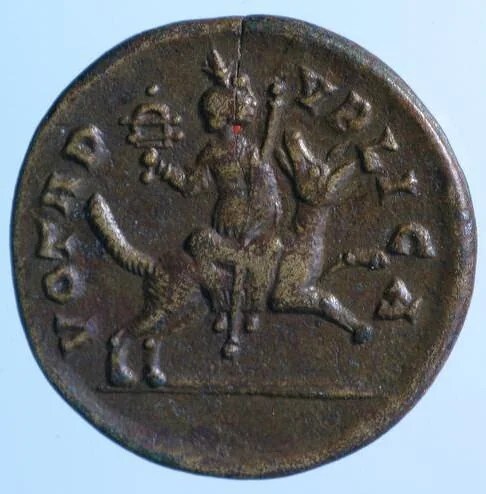 Isis, with sistrum and staff, riding a dog
Isis, with sistrum and staff, riding a dogI shimmer along the course of the starry circles wherein I move in the Canis [the star of Isis, Sirius, is in the constellation Canis Major; hence it is the “Dog Star”] constellation.
Women call me Goddess, healer of all ills. I toiled and labored to erect my dwelling in Bubastis. I, Isis, in my great wisdom, set the limits of Olympus and the humid land with dark raiment; I am She who likewise, to distinguish the seasons, delineated a winding way through the air amidst the heavenly bodies on high. Toward the celestial pole, I directed the lunar sphere, the angled bearer of the sun’s glow by its rays as well as Helios, the resplendent driver of fiery steeds, so that through harmonious courses, their axes may distinguish night from day with a dizzying, resounding movement.
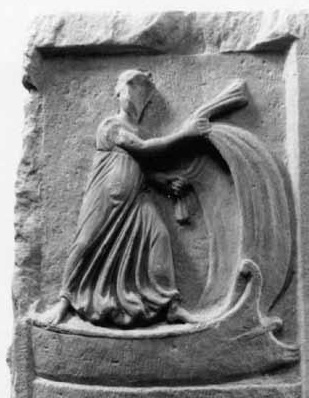 Isis Pelagia, often portrayed as striding with this wide, seafaring stance
Isis Pelagia, often portrayed as striding with this wide, seafaring stanceI am She Who first granted to men the capacity of traversing the ocean [around the seaports of the Mediterranean, Isis Pelagia, the protector at sea, was an important aspect of the Goddess]; Who fortified justice; Who at the dawn of the human race, united woman with man [other aretalogies also credit Isis with bringing together woman and man], and joyously directed newborn after newborn to the tenth lunar phase, perfect radiance of a flourishing work; She who educated the little ones who, still in the bosom, fear their parents’ punishment.
Aided by frenzied fury, I threatened with my wrath the wretched who know not love, (driving them) to howling Hades’ realm, and the black veil of the abysmal prison. I rule over a bread-producing land, for I abhor foods made by men’s destructive hands. Cave bears were frightened by it, the howling wolf, whose hunger empowers it, refusing to acknowledge it, repelled it, while in its quest for prey (?), who amidst its daily campaigns, wild, in the valley (?), which the pitiless thicket fed…spared ….in the mountains ….ignorant. …vain vigour… …they celebrate… ….his mother who devours her… …all those whose heart is roused by foolish pride… …vain…dried up… …to men, when I imposed a yoke on the…. ….the saviour… … joy for his/her mother… I Isis…still barren… …I enlarged the furrow … cut the harvest with a scythe while causing the vine to spread… the pleasant…of the days’ work… the sister’s fertile works… protectress of the suppliants long of hair… the oak still flourishing… I, Isis for the citizens… [As you can see here, this section is quite hard to make coherent sense of, given what remains of this text. It looks like the aretalogist is naming, and thus calling upon, the more wrathful aspects of the Goddess, by which She enforces Her will. The second half of this section praises Isis’ agricultural powers. But I am dying to know which “sister’s fertile works” this refers to. And I also love that She is the protectress of “suppliants long of hair,” perhaps meaning women—for Isis is always a Goddess of Women.]
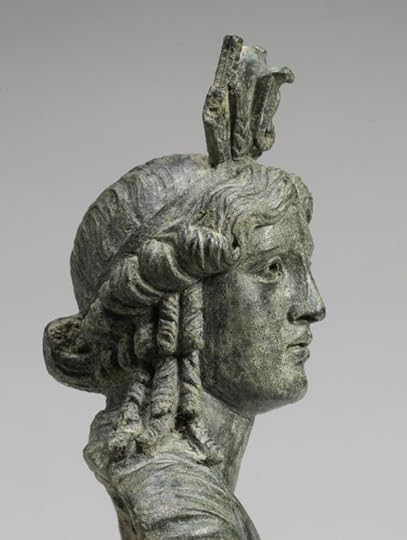
…I taught the way of placating Gods by means of statues, when formerly what was contrived by an insidious fable was celebrated by poets’ chants. My people erected temples to the (…) [This likely refers to the tradition, recorded in Plutarch, that Isis and Osiris brought civilization to humanity, including the proper ways to worship Deities, prior to which humans only had “insidious fables.” This surely also connects with the later Hermetic tradition of how to correctly enliven a Divine image. And we know Greeks were inspired by Egyptian temple construction.] I unloosed the tyrants’ cruel chains. Enyô [a Greek War Goddess, sometimes the consort of Ares], bespattered in the blood of slaughter, when I showered Her with the cursed waters at the marshes of Styx, with My wrath I expelled Her from the realm of Hades into Tartaros [the Underworld], wherein the punishments decreed the death of My terrible prey.
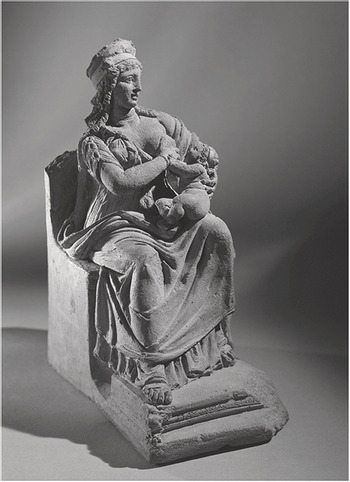 Isis the Mother
Isis the MotherIn my kindness, I provided man with a docile spouse [now we know this aretalogy was written by a man, ha!], binding both of them beneath the yoke of matrimony, while sweet Persuasion with its gentle breeze, lulled the treacherous steep gorge to sleep. I set up the pillar of pleasant law amongst the inhabitants of cities, giving it a likeness finer than gold… For us, from the dark…was born… Instead of….obtained wealth. The features of a pure…the curtains of the marriage bed embroidered with fabric like gold… who prepares marriages when young girls of the same age…. the torches with the hymenaea [nuptial hymns] as befit a lovely wedding … [This section shows Isis as a Hera-like promoter and protectress of marriage.]
I separated the…barbarian from the sound of the Greek voice [likely a reference to Isis creating different languages for the nations of humankind; other aretalogies mention this. The aretalogy of Maroneia notes that She and Hermes-Thoth devised different alphabets.] …to the mortals nature… …of contrasting shame… …I imbue the oath with dreadful terror … …swiftly the Erinys… …with her sting …with the frail ones … …offers (…) sweet as honey …wandering the ocean…I remained… …compassionate… …raising the storm… …the sea’s calm …excited ….Pontos [a primordial Sea God] in the abyss … the trace… [Again, the fragmentary nature makes it hard to understand, but all these powers of the Goddess are seen in other aretalogies: She created languages and writing. She made the oath powerful and backed up by the threat of the Erinys. She raises and calms storms at sea and She is compassionate.]
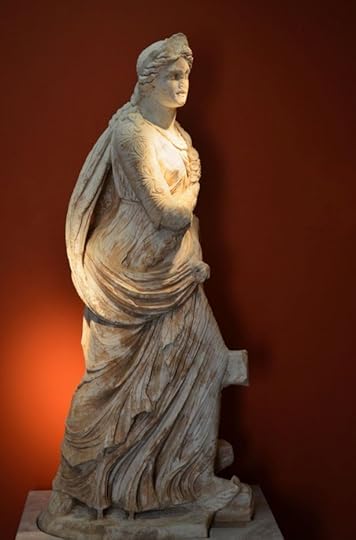 Isis Pelagia
Isis Pelagia…with my shining brother, I tend to Helios’ palace and they call me his consort [Isis can sometimes, though rarely, be the consort of Re; more often, She is His Fiery Eye, usually His daughter]. Sent through the celestial circles, I am borne upon His rays across the shining heaven. Whatsoever I set my mind to, I bring it all to fruition. At every gesture of my head, the mighty abase themselves before my power, fearing Our [the Royal “we”] supreme royalty. I untied fate from its bonds [in this period, Isis is often invoked as a Goddess Who could free one from their fate]. Amphitrite [a Greek Sea Goddess], fond of fair weather, advances across the water in Her black-prowed ship beneath the cold, unclean spray, when—a smile reddening My cheerful cheeks—I send forth baleful-armed Tethys [a Titaness Sea Goddess; sometimes assimilated with Isis]. In the navigable depths, when my desire stirs up my heart I hasten through the tortuous path to make it into a desert, and I sweep everything with a somber downpour. Pontos in his deep grottoes, silently bellows from the recesses of his sanctuary. The first, on the ship’s deck, I led the agile skiff with swelling sails, riding upon the stream while seas tamed by swift naves, Doris’ [consort of the Sea God Nereus and mother of the Neriads, a group of sea nymphs] glorious progeny emitted a whirling chorus. And My mind trembled with awe, eyes fixed on the yet unknown beating of oars. [So, here we have Isis as controller of the seas and the weather, and inventor of sea travel (“as-yet-unknown beating of oars”).]
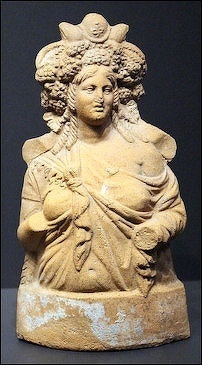 Isis of Abundance
Isis of AbundanceI, Isis, against the frigid cloud of wars with its woes, compassed the opulent kingdom with a circle of battlements. From the hollow of their roots, I uplifted islands from deep mire to light. Even mountains I brought forth, the foundation of fields fit for sowing, and the verdant meadow that I spread over firmly established heights, pleasing to cattle sheds and shepherds. Over the bubbling wave did Nereus strike with his trident the resounding flow, sparkling with foamy flowers, at the shores hurtling against the even rocks. From my dewy brow, I urge forth abundance for my native fruitful land, the ripening grape, dispenser of pleasure. Making thunder coruscate with boundless might, I roar it forth, a fierce threat to mortals. What fate’s distaff has spun, what Atropos [one of the Fate Goddesses] ever twirls with her hands in impetuous whirls, has obeyed me,…endlessly… …reed stalks… …in whirls. Rending clods asunder… …over the seas… …thick ash… the Nile’s…” [And in this final section, we see Isis as a protectress, shielding the “opulent kingdom” with battlements, as a Creator Goddess Who raised the islands and created the earth for humans and animals, and also as ruler of the sometimes-frightening powers of Nature. In addition, Isis rules Fate and Fate obeys Her, which was one of Her most important functions in the Greco-Roman period.]

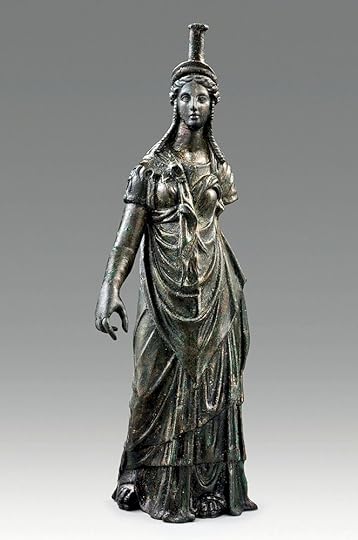 Isis Fortuna; love Her graceful posture
Isis Fortuna; love Her graceful postureIn addition to promoting a sense of community among Isis devotees throughout the Greco-Roman world, the Isis aretalogies “spread the gospel” of Isis. They helped to universalize the powers and nature of Isis so that people outside of Egypt could see Her as a Deity they, too, could love and call upon in their times of need. Although Isis always remained connected to Her native Egypt, through the aretalogies, She could easily be understood to extend Her powers to other lands, and other peoples, as well.
Just as, in Egypt, Isis was known as “The Only One” (Ta Uaet), and She expressed a full range of Divine powers as “Isis, Goddess in All Names” (Iset, Nutjeret em Renus Nebu), now this universalizing idea came with Her as She moved outside of Egypt, and She became—for so many people in the Mediterranean world—the Goddess of Ten Thousand Names.



